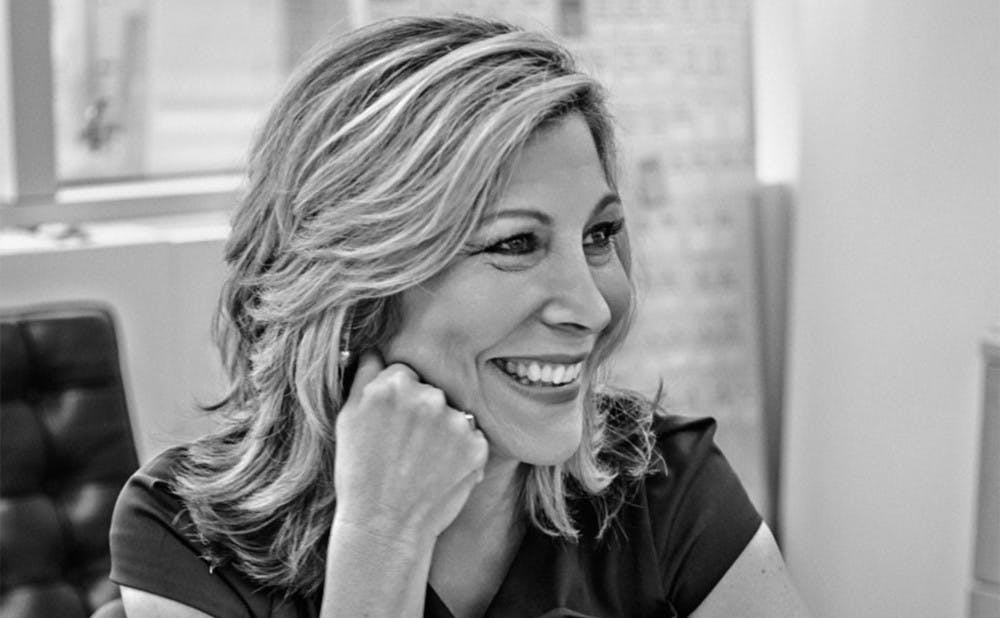Lesley Jane Seymour graduated from Duke in 1978 and is now the editor-in-chief of More Magazine. The Chronicle’s Jessica Williams conducted an email interview with Seymour, who visited campus last weekend for the Duke Women's Weekend and an Artstigators coffee chat with students, about her challenges at Duke and her lifelong career in writing.
The Chronicle: When did you first become interested in writing and editing?
Lesley Jane Seymour: I had been writing since I was a child of ten. I wrote novels about my pet parakeet Chat Chat. I have always been a communicator. That is my thing in life. Editing came later and by accident. Three publishers asked me, when I was the beauty editor at Glamour Magazine, if I had ever thought of becoming an editor-in-chief. I had not. But following the adage that if three people think you look sick you should go to bed, I decided I should look for a job as an EIC. I landed at [More Magazine].
TC: What was the transition between writing and editing like?
LJS: The transition between writing and editing was very hard. I had many older editors tell me when I was younger that I was such a great writer that I could never edit; they assumed I was unable to see beyond my way of doing things. I actually think being a writer first makes me a more empathetic editor because I understand the difficulties of writing.
TC: How did you become interested in journalism about beauty?
LJS: I like journalism because I believe words can change the world. And they do. Look at Snowden; whether or not you think he is a hero or a criminal he changed the world with words. We do that every day in magazines: showing women the first pictures of what melanomas look like (this is before the internet) and saving their lives. It is a worthy and fabulous profession and if you are the kind of person who must have a voice on the world, then you need to be a journalist. I have done everything from raising signatures for gun control in Congress to getting Congress to have a moment of “talk” about domestic violence. I have changed people’s lives for the better and this is what makes me feel like I have purpose.
TC: What’s been the hardest part of being an editor?
LJS: The hardest thing about being an editor is saying no. There are tons of people who would like to write, think they can and simply can’t. I have a soft heart. I have learned to say no but in ways that don’t damage someone’s ego or enthusiasm. My standards have always been very high; I don’t dumb things down. I always assume my readers are smart—and they are.
TC: As the editor-in-chief of a magazine, what is a normal day like for you?
LJS: My day can be easy or crazed. It could be in the office editing pieces and looking at film or chasing the First Lady around the world to watch her launch Let Girls Learn. I think the most important thing about running a magazine—for me—was that I was never sitting behind a desk and never knew what each day holds. I like surprise and a fast pace. That keeps my brain going and makes life fun. I also am incredibly curious about everyone and everything. When I drive by a home with a light on while on the metro in Paris, I always wonder what stories the people living there have. I am always trying to figure out how the world works and why people do what they do.
TC: Do you think your time at Duke impacted your goals or career in any way?
LJS: Duke was a tough time for me. I had very difficult parents who I was constantly trying to please by being a science student. My science grades did not take off but my writing grades did so I switched to an English major my junior year. They were not pleased. I was overwhelmed at Duke by the pressure to get good grades and be social and beautiful all the time (I put makeup on and curled my hair before class if you can believe it!) I had a hard time concentrating on my academics because I had not worked out all my issues with my parents at that time. So Duke was not joyous for me; it was simply okay. I learned a lot but never really found a connection there. I am much more connected now as an adult and when I can see that my issues kept me from taking advantage of all the school had to offer. It is a vastly different school today as well—much more open, heterogeneous and sophisticated.
TC: Do you have any advice for women interested in pursuing a career in journalism?
LJS: There will always be journalists and always be journalism. It is a worthy calling and a necessary balance to the secrecy of those holding power in our democracy. It doesn’t matter what venue you use for your story telling—whether it is digital, movies, video, art, words—long form or short—you should just do it. What is wonderful about today is that you no longer have to ask anyone to be a journalist. You can pick up your phone and tweet about things you see and injustices you video and you are doing journalism. It is a wonderful time for citizen journalists—so I say start there and just get to it.
Get The Chronicle straight to your inbox
Sign up for our weekly newsletter. Cancel at any time.

